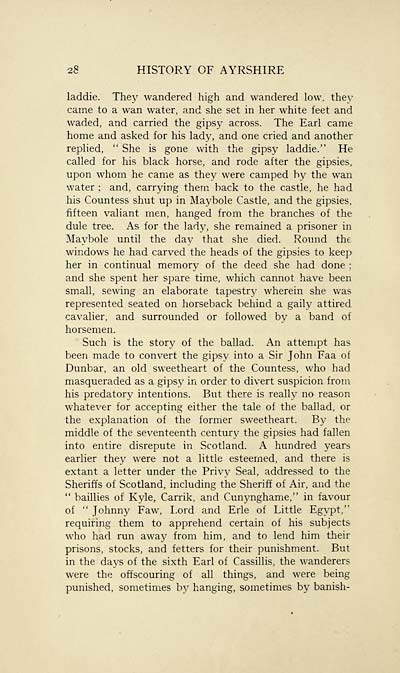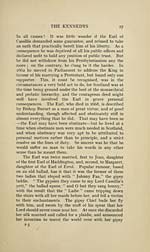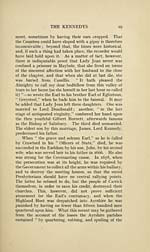Download files
Complete book:
Individual page:
Thumbnail gallery: Grid view | List view

28 HISTORY OF AYRSHIRE
laddie. They wandered high and wandered low. they
came to a wan water, and she set in her white feet and
waded, and carried the gipsy across. The Earl came
home and asked for his lady, and one cried and another
replied, " She is gone with the gipsy laddie." He
called for his black horse, and rode after the gipsies,
upon whom he came as they were camped by the wan
water ; and, carrying them back to the castle, he had
his Countess shut up in May bole Castle, and the gipsies,
fifteen valiant men, hanged from the branches of the
dule tree. As for the lady, she remained a prisoner in
Maybole until the day that she died. Round the
windows he had carved the heads of the gipsies to keep
her in continual memory of the deed she had done ;
and she spent her spare time, which cannot have been
small, sewing an elaborate tapestry wherein she was
represented seated on horseback behind a gaily attired
cavalier, and surrounded or followed by a band of
horsemen.
Such is the story of the ballad. An attempt has
been made to convert the gipsy into a Sir John Faa of
Dunbar, an old sweetheart of the Countess, who had
masqueraded as a gipsy in order to divert suspicion from
his predatory intentions. But there is really no reason
whatever for accepting either the tale of the ballad, or
the explanation of the former sweetheart. By the
middle of the seventeenth century the gipsies had fallen
into entire disrepute in Scotland. A hundred years
earlier they were not a little esteemed, and there is
extant a letter under the Privy Seal, addressed to the
Sheriffs of Scotland, including the Sheriff of Air, and the
" baillies of Kyle, Carrik, and Cunynghame," in favour
of " Johnny Faw, Lord and Erie of Little Egypt,"
requiring them to apprehend certain of his subjects
who had run away from him, and to lend him their
prisons, stocks, and fetters for their punishment. But
in the days of the sixth Earl of Cassillis, the wanderers
were the offscouring of all things, and were being
punished, sometimes by hanging, sometimes by banish-
laddie. They wandered high and wandered low. they
came to a wan water, and she set in her white feet and
waded, and carried the gipsy across. The Earl came
home and asked for his lady, and one cried and another
replied, " She is gone with the gipsy laddie." He
called for his black horse, and rode after the gipsies,
upon whom he came as they were camped by the wan
water ; and, carrying them back to the castle, he had
his Countess shut up in May bole Castle, and the gipsies,
fifteen valiant men, hanged from the branches of the
dule tree. As for the lady, she remained a prisoner in
Maybole until the day that she died. Round the
windows he had carved the heads of the gipsies to keep
her in continual memory of the deed she had done ;
and she spent her spare time, which cannot have been
small, sewing an elaborate tapestry wherein she was
represented seated on horseback behind a gaily attired
cavalier, and surrounded or followed by a band of
horsemen.
Such is the story of the ballad. An attempt has
been made to convert the gipsy into a Sir John Faa of
Dunbar, an old sweetheart of the Countess, who had
masqueraded as a gipsy in order to divert suspicion from
his predatory intentions. But there is really no reason
whatever for accepting either the tale of the ballad, or
the explanation of the former sweetheart. By the
middle of the seventeenth century the gipsies had fallen
into entire disrepute in Scotland. A hundred years
earlier they were not a little esteemed, and there is
extant a letter under the Privy Seal, addressed to the
Sheriffs of Scotland, including the Sheriff of Air, and the
" baillies of Kyle, Carrik, and Cunynghame," in favour
of " Johnny Faw, Lord and Erie of Little Egypt,"
requiring them to apprehend certain of his subjects
who had run away from him, and to lend him their
prisons, stocks, and fetters for their punishment. But
in the days of the sixth Earl of Cassillis, the wanderers
were the offscouring of all things, and were being
punished, sometimes by hanging, sometimes by banish-
Set display mode to:
![]() Universal Viewer |
Universal Viewer | ![]() Mirador |
Large image | Transcription
Mirador |
Large image | Transcription
Images and transcriptions on this page, including medium image downloads, may be used under the Creative Commons Attribution 4.0 International Licence unless otherwise stated. ![]()
| Histories of Scottish families > Ayrshire > Volume 2 > (38) Page 28 |
|---|
| Permanent URL | https://digital.nls.uk/95189554 |
|---|
| Attribution and copyright: |
|
|---|---|
| Description | A selection of almost 400 printed items relating to the history of Scottish families, mostly dating from the 19th and early 20th centuries. Includes memoirs, genealogies and clan histories, with a few produced by emigrant families. The earliest family history goes back to AD 916. |
|---|

